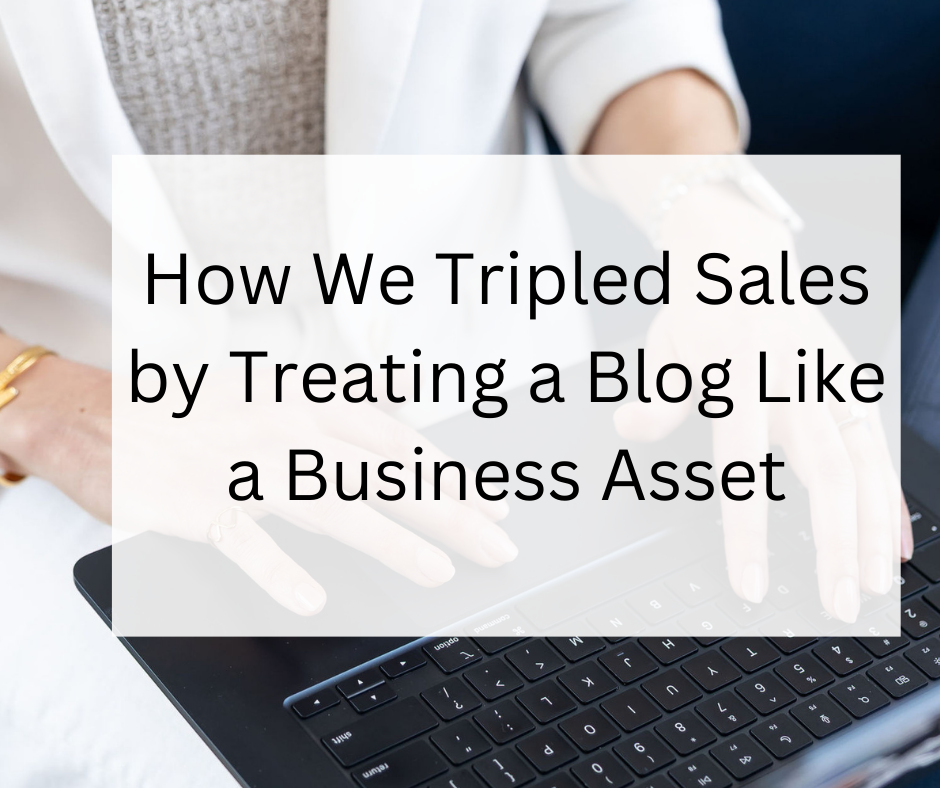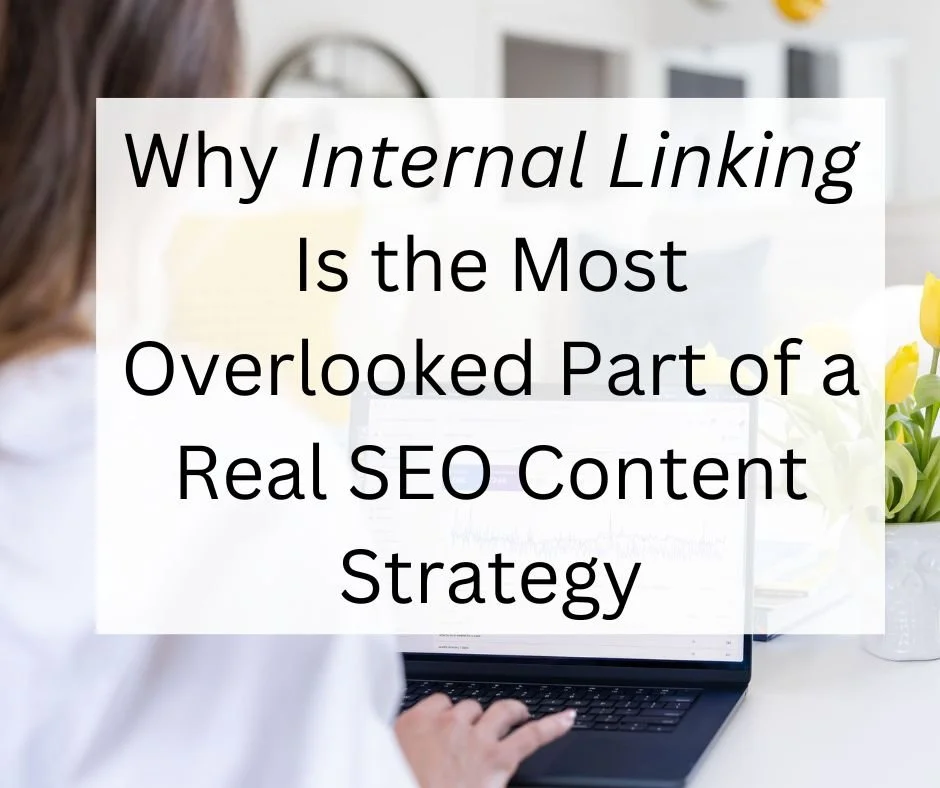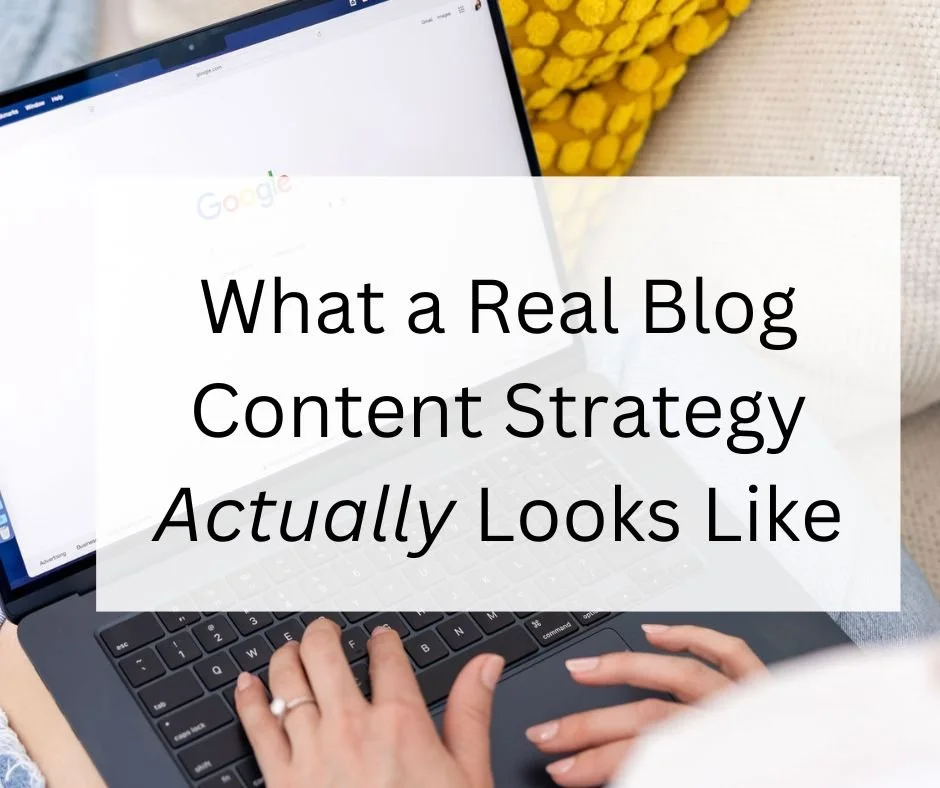Common Keyword Mistakes That Are Hurting Your Website
Most people think they know what keywords are. You pick a few popular search terms, sprinkle them onto your website, and wait for the traffic to roll in, right?
Not quite.
In reality, most small business owners and even some marketers are using keywords in ways that don’t actually help them show up on Google, and in some cases, actively hurt their chances. I see the same keyword mistakes over and over again: targeting broad, high-competition terms, stuffing exact matches into every sentence, relying on plugins for guidance, or ignoring what people actually want when they search.
This post is here to clear things up.
I’m going to break down the most common keyword misconceptions and answer the questions people think they’ve already answered, like how many keywords to use, where to put them, how to choose the right ones, and what tools (including AI) can actually help. Whether you’re doing SEO for your own business or trying to understand why your content isn’t ranking, this will help you avoid wasted effort and start building a smarter keyword strategy.
Keyword Mistakes to Avoid
So let’s start with a list. These are the most common mistakes I see:
Choosing keywords that are too broad
Trying to compete with big-name websites
Ignoring user intent (Are they looking to buy, research, or just browse?)
Not Googling the keyword before using it (Check the actual results!)
Keyword stuffing (Google hates it. So do readers.)
Relying on SEO plugins to tell you what to do
Only using exact-match keywords (Variation is your friend)
Ignoring long-tail and low-volume keywords (These are often the ones you’ll rank for!)
If this list doesn’t make any sense to you, don’t worry! By the end, it should all make sense, and you should feel way more confident in your keyword selection. But let’s start with the big picture first. Don’t skip this part!
What Even Is a Keyword?
Before we get into where to put keywords or how to choose them, let’s zoom out.
A keyword is simply the word or phrase someone types into Google when they’re looking for something. That’s it.
But behind that simple definition is something much deeper: every keyword represents a real person, with a real question, need, or problem they’re trying to solve. And that means good SEO isn’t just about plugging words into a tool and copying what comes out. It’s about understanding your audience, including how they think, what they’re searching for, and what kind of language they actually use when they’re looking for a solution.
This is where tools fall short.
No AI tool or keyword software can understand your customers better than you can. You know what questions people ask over and over again. You know the objections, the pain points, the confusion, the aha moments. That knowledge is pure gold, and it’s the foundation of a successful keyword strategy.
Because at the heart of SEO is one simple goal:
Get your website to show up as the best possible answer to someone’s search.
And to do that, you need to step into your customer’s shoes. What would they type into Google at each stage of their journey? What would they search for if they were just starting to explore your service? Or what if they were ready to buy today?
Once you start thinking in those terms, keywords become less of a checklist item and more of a strategy tool.
Common Basic Questions About Keywords
Q: Do keywords have to be one word?
Nope. In fact, the most valuable keywords are phrases like “best dog trainer in Seattle” or “how to file taxes as a freelancer.” SEO people call these long-tail keywords.
Q: What is an example of a good keyword?
Let’s say you own a landscaping business in Vancouver. A strong keyword might be (depending on what the data shows):
✅ “landscape design services Vancouver”
This keyword is powerful because it’s:
Specific – It calls out a particular service (landscape design, not just general landscaping)
Local – It includes the target location (Vancouver)
Intent-driven – The word “services” suggests the searcher is looking to hire
Now compare that to some weaker keyword choices:
❌ “landscaping”
This is too broad. Are they looking for a definition? Tips? Jobs? Commercial or residential services? There’s no way to tell. It’s also extremely competitive.
❌ “best landscaping”
Still vague. Where? For what kind of project? Are they searching for design ideas, a company to hire, or DIY tips?
❌ “best landscaping Vancouver”
Better, but most people typing this are looking for listicles, not service pages. They want reviews and comparisons. So unless this keyword is for a blog post that you are going to write listing out multiple companies, you’re still not matching intent perfectly.
The point?
The best keywords clearly match what your ideal customer is actually searching for, in their own words. That usually means longer, more specific phrases that include location, service type, and search intent.
💡 Pro Tip: If the keyword doesn’t make it obvious what someone is looking for (or it’s something you’d never say out loud as a customer) it’s probably not a good keyword.
How Do I Find and Choose the Right Keywords?
This is one of the most common questions, and unfortunately, one with a very unsatisfying answer: it depends.
When keyword research is done well, it’s not just a quick search in a tool or asking ChatGPT for a list. It’s a process, and that process can look very different depending on:
What type of page you're working on (a blog post vs. a service page vs. a product page)
Whether you’re creating something new or optimizing something that already exists
Whether you’re building a full content strategy or just working page by page
Your industry, your audience, and your own business goals
That’s why there’s no one-size-fits-all method. But generally, a well-rounded keyword research process includes four key elements:
1. Idea Generation
This is the brainstorming phase. and it’s where your creativity and knowledge of your audience really matter.
You might use tools like:
Reddit, Quora, and People Also Ask to explore real questions people ask
ChatGPT to spark ideas or help you explore related topics
Your own customer conversations and FAQs, which are so useful
If you’re updating an old page, this phase might start with a different question:
👉 What is this page already showing up for?
That’s where Google Search Console comes in. It helps you find those low-hanging keywords you're already ranking for, even if they're on page 2 or 3.
2. Research Tools for Solid Data
Once you’ve got ideas, it’s time to back them up with real data.
This is where you use free (or paid) keyword research tools to check:
Search volume (are people actually searching for this?)
Difficulty/competition (can I realistically rank for it?)
Variations and related terms
Some common tools:
Google Keyword Planner
Ubersuggest
Google Trends
KeywordTool.io
Search Console (for existing content)
3. Common Sense & Business Knowledge
Not every keyword with search volume is a good fit. This is where YOU, the business owner, are the expert.
You know:
What your customers really want
What questions they ask before buying
What types of clients you want more of
What services/products are most profitable
Can AI answer this query easily without further clicking?
All of that should shape your choices. Just because a tool says a keyword is “easy” or “high volume” doesn’t mean it fits your brand, your customer, or your goals. And now with AI taking over more and more, finding a keyword that requires clicking to websites for further investigation is another layer to consider.
4. Competitor & SERP Research
Lastly, always Google your keyword.
Ask yourself:
Who is showing up on page 1?
Are they competitors offering the same thing?
Are the results blog posts, product pages, or directories?
What does Google seem to think this keyword means?
Can I actually compete with this?
What type of results is Google generating? AI overviews, videos, forums, social media, shopping, etc.?
This gives you a reality check and helps you understand the search intent behind the keyword, which is crucial if you want your content to be the best result for that query. It also tells you where to prioritize sharing your content.
So... What’s the “Right” Way?
There isn’t just one right way, and that’s okay. Everyone develops their own approach, and it may change depending on the goal.
But if you want to learn how to do keyword research for free and a method you can follow step-by-step, I’ve got you covered.
How Many Keywords Do I Put on One Page?
This is another common misunderstanding that I see. After doing the keyword research, people don’t know how many keywords go on each page.
This is an easy answer. One main keyword per page/post is the best practice. This keeps your content focused and targeted.
That said, you should absolutely use related terms and variations. This is called semantic SEO. Google understands that people search using many different phrases, so using synonyms and related words helps your content rank for a broader set of queries without feeling repetitive or awkward.
For example, if your main keyword is “landscaping services in Vancouver,” you might also naturally include phrases like:
“garden design”
“lawn care”
“yard maintenance”
“professional landscapers”
These related terms support your main topic and give Google more context about what your page covers.
Where Do I Put My Keyword on My Page?
Before we get into the “where,” let’s talk about the “how.” Because this is where a lot of people go wrong.
Don’t Keyword Stuff 🙅♀️
Keyword stuffing is when you repeat the same phrase over and over to try and rank. It makes your content sound robotic or awkward. Google doesn’t like it, and more importantly, neither do your readers.
Bad example:
“If you’re looking for landscaping in Vancouver, our landscaping in Vancouver company offers the best landscaping in Vancouver…”
Yikes. Don’t do that.
Don’t Force Exact Matches
You don’t need to repeat your keyword word-for-word every time. Google is smart. It understands related phrases, synonyms, and natural language.
So instead of saying “Vancouver landscaping services” five times in a row, you can vary it with phrases like:
“landscape design in Vancouver”
“professional landscapers”
“garden renovation services”
“serving homeowners across Vancouver”
The key is to write for humans first. If your content is helpful and clearly focused on the topic, search engines will understand.
Don’t Rely on a Plugin
An SEO plugin might be telling you that you need to have your exact keyword in multiple places, but that’s not always the case.
Let’s say you optimized an existing page, and your plugin is telling you that you need to change the URL. While, yes, you should ideally have your keyword in your URL, there are two problems here:
Changing your URL creates a new page that needs to be redirected and can cause a whole other set of tech issues.
Some keywords are way too long to put in a URL.
Or let’s say you optimize a product page, and the best keyword for the product doesn’t actually match the name of the product. You’re plugin may be telling you that you need to have your exact match keyword in your H1, but it doesn’t look right.
Here’s an example of that from one of my ongoing clients. They sell a fabric called “Garden Snake” in black in a collection called Ooh Lucky Lucky. To match the Hierarchy of their website, the product is named: “Ohh Lucky Lucky - Garden Snake - Black”. But unless someone knows of this specific product, they aren’t typing that into the search bar. The keyword needed to be more descriptive, so I used “black fabric with colorful snake and butterfly print”.
Now I did NOT replace her product name in the H1 with that! Nor did I change its URL. So if I were to look at a plugin, it would tell me that I’m doing my SEO all wrong. 🤷♀️
So… Where Should You Use Your Keywords?
Now that we’ve cleared that up, here are the main places to include your primary keyword (and variations) in an ideal world:
✅ 1. Meta Title (aka SEO Title)
This is what shows up in Google search results. It should be clear, clickable, and include your keyword.
✅ 2. H1 Heading
This is the main heading on your page. Every page should have one H1 that tells people (and search engines) what the page is about.
✅ 3. URL Slug
Short, simple, and keyword-focused. For example:
yourwebsite.com/vancouver-tree-removal
✅ 4. Meta Description
While it doesn’t directly affect rankings, a well-written meta description with your keyword can boost click-through rates.
✅ 5. First 100 Words of Body Text
Google often pulls this section to preview your page. Mention your keyword early on, but naturally.
✅ 6. Subheadings (H2s and H3s)
Break up your content with relevant subheadings that include variations of your keyword.
✅ 7. Image Filename and Alt Text
Use descriptive filenames and alt text that include relevant keywords (when appropriate). Don’t stuff here either. Just describe the image naturally.
✅ 8. Internal Links
When you link to related pages on your site, use anchor text that includes relevant terms.
✅ 9. Throughout the Content
Use your keyword and related phrases naturally in the body of the page. You don’t need an exact number, but just enough to make it clear what the page is about.
Keyword Placement Isn’t About Hitting a Number
It’s about clearly communicating what your page is about to both your reader and to Google. Use keywords strategically, but don’t force them. If your content is helpful and focused, the keywords will fall into place.
Final Takeaways
At its core, effective keyword strategy isn’t just about chasing high search volumes or plugging in random phrases. It’s about deeply understanding your audience, including their language, their needs, and where they are in their journey. The heart of SEO is presenting your website as the best, most helpful answer to the exact questions your ideal customers are asking.
So, when you choose keywords, focus on intent, competition, and how those words truly align with your business and your audience’s pain points. Write with clarity and usefulness, always putting people first, because behind every search query is a person looking for a solution.
Take a fresh look at your own website or blog. Are your keywords really speaking to your customers? Are you answering their questions in the way they search? Revisiting your keyword approach with your audience front and center is the most important step you can take to make SEO work for you.
Need a second set of eyes? If you want personalized advice on your keyword strategy or help optimizing your pages for your ideal customers, don’t hesitate to reach out. I’m here to help you turn your SEO efforts into real results.
And if you’re starting with AI-assisted drafts, here are smart ways to make sure your content still sounds like you: Can AI Write My Blog Posts?


